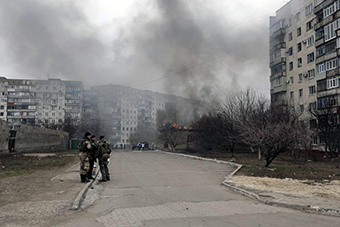
Pro-Russian Militants Bombard Mariupol
| published January 25, 2015 |
By R. Alan Clanton
Thursday Review editor
With the threats from ISIS and al Qaeda coming in a daily, end-on-end stream of news—the two terrorist and militant organizations seemingly competing for headlines each day—the war in the Ukraine has become, for many in the west, a long-forgotten piece of recent history.
But that bloody and violent civil war rages on, and the news of its ebbs and flows have been largely overshadowed by gas prices, weather, ISIS and al Qaeda, and a barrage of terror concerns now reverberating from Paris and sweeping across Europe. This past week the world watched in horror as ISIS made good on another in its grim series of threats, murdering a Japanese man named Harman Yukawa, and now threatening publicly to behead a second Japanese citizen, journalist Kenji Goto.
But in the Ukraine, where civil war has raged for more than a year, the violence has grown worse despite the conflict’s apparent absence from the headlines.
This week, heavily-armed pro-Russian militants used Russian-made rockets to unleash heavy attacks in and around the city of Mariupol, in southeastern Ukraine, a bombardment so intense that at least 35 civilians have died. Rebels fired rockets indiscriminately onto the city and its suburbs, damaging businesses, schools, markets, apartments and houses. Initial reports from the city say that the ordnance being used is Russian-made, and is being fired using Russian military equipment positioned near the border.
Both NATO and several European Union countries condemned the attacks as tantamount to an act of terrorism, since there would be little to gain militarily from such a sustained rocket attack except to terrorize the civilian population and force a general evacuation of the area. In Kiev, President Petro Poroshenko called an emergency meeting of top military officials to craft a response. Poroshenko also issued a stern warning to Moscow to stop interfering in Ukraine’s civil war. Russia has consistently denied any involvement in the Ukraine, calling the rebel movement an organic response to Kiev’s growing closeness with Western Europe and the European Union. But most military analysts in the United States and the United Kingdom say that the militants are too heavily armed and too well supplied—often with new Russian-made hardware and weaponry—to be acting alone.
The Ukrainian Army quickly responded to the bombardment of Mariupol by sending troops and armor into the area even as hundreds fled outward from the region.
Mariupol is a port city on the Sea of Azov, not far from the border which separates Russia from the Ukraine. Its location may turn out to be of strategic importance as the violence escalates: Mariupol possesses a large port, serves as a significant transportation hub, and sits close to both the border and the upper part of the Crimea, an area annexed by Russia last year at the beginning of the fighting in the Ukraine. The city also has several large oil and gas distribution facilities. Other military analysts say that the underlying importance of Mariupol is that by taking it (and some areas around it), the militants will open up a land corridor along the coast, presumably connecting Russian assets with the Crimea.
Some of the areas which experienced the heaviest rocket bombardments are located at the eastern edge of the city, where numerous high-rise and mid-rise apartment buildings loom at the edge of wide tracts of agricultural land—making the eastern flank of the crowded town an easy target for rocket-fire or artillery.
Angry rhetoric, accusations and counter-accusations have increased the past week, and as tempers flare among commanders in the field, there are worries that the year-long civil war could escalate again quickly.
The bombardment of Mariupol was accompanied by statements broadcast by rebel commander Alexander Zakharchenko, who stated that “the assault on Mariupol has begun.” But after several hours of intense and indiscriminate rocket fire, and after reports of the heavy civilian casualties reached the militant headquarters in Donetsk, Zakharchenko changed his public comments, and promised only that there would be no immediate attack on Mariupol. Rebel commanders later said that the rocket attacks were misdirected by mistake, but blamed Kiev for the rising tensions. In Moscow, the official explanation was that the Ukrainian troops were at fault for spurring increased tension in the coastal region of southeast Ukraine. Russian spokespersons also said that heavy Ukrainian troop movements triggered this latest deadly escalation.
In Kiev, the government has repeatedly complained that Russia is meddling in its internal affairs by not only supporting the militants, but also by sending troops across the border into several areas of Eastern Ukraine. Though Moscow steadfastly denies it has any troops in the Ukraine, the Defense Ministry in Kiev and President Petro Poroshenko estimate that there are at least 9000 Russian soldiers inside Ukrainian territory.
An investigation by the Hague and other authorities say that it was a Russian-made rocket launching system—as well as a Russian made missile—which shot down a Malaysian jetliner over Eastern Ukraine last summer. That incident killed all 298 passengers and crew.
Related Thursday Review articles:
The Economic Impact of Ukraine’s War; R. Alan Clanton; Thursday Review; August 25, 2014.
Sanctions Talk, Money Walks; R. Alan Clanton; Thursday Review; July 31, 2014.
